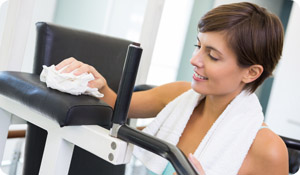
You know it's important to make exercise a regular part of your life, but what you might not realize is that there’s more to a healthy routine than working up a sweat—neglecting to take care of your gym gear can have health consequences. If you're putting in the time to improve your strength and stamina, make sure you don't sabotage your efforts with shoddy hygiene that could lead to fungal or bacterial infections. Make the following practices part of your workout repertoire and you'll reap the rewards:
- Wash your sneakers. Even if you're a prolific racer who wears out a pair of running shoes every few months, you still need to clean your footwear during its lifespan. How often should you do this? "You can wash your shoes once a month or sooner if they get smelly or excessively dirty,” says John P. Higgins, MD, associate professor of cardiology at The University of Texas Health Science Center at Houston and chief of cardiology at the Harris Health System’s Lyndon B. Johnson Hospital. He recommends either hand washing in a bucket of water with soap or detergent, putting the shoes in the washing machine inside pillow cases and setting the machine for a short, gentle cycle, or placing the sneakers on the top rack of the dishwasher and setting it for a short cycle. Clean, wet shoes should be air-dried.
- Get new sports bras. Once you find a sports bra you love, it can be tough to part with it. But no matter how cute it is, a sports bra eventually will wear out. When this happens, it's no longer giving your breasts (and back) the support they need. Higgins recommends replacing a sports bra after either 100 wearings or three months—or as soon as you notice that the elasticity is gone.
- Clean your ear buds. If you give very little thought to your ear buds beyond what kind of music they pipe into your head, consider this: Ear buds that are constantly drenched in sweat without being sanitized between uses can cause an ear infection called otitis externa (a fungal infection of the outer ear). Yuck!
The general rule? Any time your buds get damp, clean them. If you can, unclip the flexible parts that go into the ear and immerse them in warm water mixed with gentle soap or detergent. Let them sit for five minutes, then rinse with clean water and dry with a cloth. If you can't take apart the buds, use an alcohol-soaked cloth to wipe them down. Afterwards, blot them with a tissue or even give them a quick pass under a hairdryer. And try to buy ear buds that are specifically formulated to withstand sweat, such as those marked "water resistant." - Shower immediately after you work out. As compelling as it may be to run errands before going home to shower, resist the urge. "Bacteria love wet, moist [skin] or clothing," Higgins says. "So get out of [your workout wear], wash, and dry [yourself] to prevent infections." Not to mention the fact that other people will appreciate you a lot more if don't sport a pungent post-workout aroma.
- Do sweat the small stuff. While treadmills and other big machines need to be maintained regularly, don't ignore the smaller components of your workout. Exercise bands and tubes may need to be bought new every few months if they're heavily used. What to watch for: small cracks, tears, or thinning spots. Also, they may not feel as elastic as they should. Still chugging from plastic water bottles? According to Higgins, metal is a must as it's less likely to become a bacteria breeding ground. And a gym bag easily can begin to fester with daily use, so put sodden garments directly into a plastic bag before stuffing them inside your duffel. Air out the bag after each use by opening all zippers and compartments.
- Don't share. No matter how close you are to someone, it's never a good idea to share items like towels, shower shoes, or gym equipment that hasn't been sprayed with disinfectant. You can get a host of infections that way, from ringworm—a fungal infection causing a round, itchy rash—to MRSA (methicillin-resistant staphlococcus aureus), a potentially serious bacterial infection that makes its way in through small breaks or cuts in your skin. Left untreated, MRSA can lead to infections of the bloodstream, bones, lungs, and other organs.
John P. Higgins, MD, reviewed this article.
Sources
John P. Higgins, MD. E-mail interview. November 17-19, 2014. https://med.uth.edu/internalmedicine/faculty-staff/john-p-higgins/
"MRSA Infection: Complications." Mayo Clinic. Page updated November 13, 2012.





